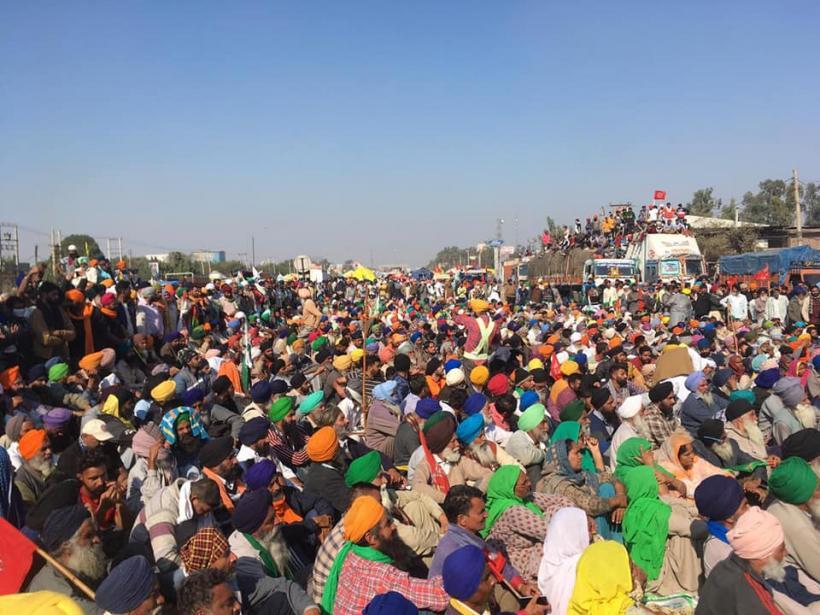Agristack Policy Aimed at Benefiting Corporates, Dispossessing Farmers: Experts

File Photo
While the farmers’ protest continues to rage throughout the country, for the seventh month now – the Modi-led Union government is making a fresh push to overhaul the agricultural sphere by digitising land records and creating a centralised farmer database under ‘AgriStack’.
The policy has been in talks for the past year and was given shape in April earlier this year – when the Union government entered into a Memorandum of Understanding with corporate tech giant Microsoft. While the Modi government claims and hails the move as a big digital push for the sector, the move is being looked at as one which aims towards further commercialisation of the sector, with private input dealers and companies making the most out of the acquired data.
Currently, the deadline to provide public feedback on the proposed policy is nearing on June 30. Meanwhile, the government has already entered into agreements with companies such as Amazon and Patanjali – which also entail significant data sharing details.
Down to Earth reported that the MoU with Microsoft Corporation is aimed at starting a pilot project in 100 villages of Uttar Pradesh, Madhya Pradesh, Gujarat, Haryana, Rajasthan and Andhra Pradesh. The MoU requires Microsoft to create a ‘Unified Farmer Service Interface’ through its cloud computing services.
Under the proposed stack, data will be reportedly collected about personal details of farmers, profile of land held, production details, finances and more, and the collected data will further be linked to Aadhaar.
Speaking with NewsClick, Agnidipto Tarafder, Assistant Professor at the West Bengal National University of Juridical Sciences said, “Agristack is trying to create a one stop database for one stop record, essentially creating a dossier on a citizen – identities, holdings, everything shows up. The problem is not with the data but what it symbolises. If one’s life becomes a dossier for the government, the concerns are what are the measures the government is taking to protect this data. The second key question is to tackle the accuracy of the data that is being entered. What is the accountability framework that the government has come up with?”
Also read: UIDAI Made Rs 240 Crore Via eKYC Authentication over 21 Months: RTI
More than 50 farmers' groups and digital rights organisations have criticised the proposal on various accounts. Moreover, concerns relating to privacy and dispossession have been flagged by experts.
Kavitha Kuruganti, founder convenor of the Alliance for Sustainable & Holistic Agriculture (ASHA), flagging these concerns said, “While there are of course issues on privacy and informed consent, what kind of monetisation will happen and who will benefit from it, the important point is that the beginning point of an effort like this has to be held in the context of already existing databases. The government wants to evaluate how it will facilitate the benefits for corporates. The government instead needs to prioritise the needs of the farmers in a highly democractic localised way.”
She added, “The beginning point has to be the needs of the farmers. In the bid towards digitisation, corporations come along and occupy this space – the farmers' requirements need to be prioritised in this process.”
The Internet Freedom Foundation in its primer on the policy has flagged the exploitative turn the policy could take by stating that, “Financial lending models relying on technology towards farmers may offer usurious rates for those in dire need. Given the incomplete nature of land title records, farmers may also be exploited by land grabs by large agribusinesses.”
The current MoU with Patanjali is focused on advising farmers on quantification of crop and yield, and developing a mobile application for advising farmers on soil nutrition. While the agreement with Amazon is focused on building a “National Agri Data Stack” to create agri-focused solutions aiding cloud services and agriculture related startups too.
Jaswant Singh of the All India Kisan Sabha said, “The Agristack policy will further the interest of corporations in taking away autonomy from the farmers, while excluding several others. The biggest impact will be the exclusion and dispossession of sharecroppers and small and marginal farmers. The point is that corporations will move further towards privatising agriculture.”
Get the latest reports & analysis with people's perspective on Protests, movements & deep analytical videos, discussions of the current affairs in your Telegram app. Subscribe to NewsClick's Telegram channel & get Real-Time updates on stories, as they get published on our website.
























